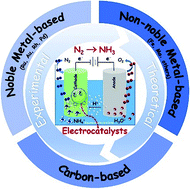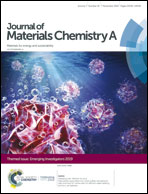Ambient dinitrogen electrocatalytic reduction for ammonia synthesis
Abstract
Ammonia holds considerable significance for modern human community and the natural world. Ambient electrochemical NH3 synthesis powered by renewable energy rather than the energy-intensive Haber–Bosch process is promising for the future development of a sustainable society. Developing highly efficient electrocatalysts with low overpotential, considerable selectivity, and faradaic efficiency is, therefore, necessary, yet formidably challenging. In this review, various advanced technologies and available electrocatalytic materials for ammonia synthesis under mild conditions are briefly reviewed based on both experimental and theoretical studies. Three categories, namely, noble-metal-, nonnoble-metal-, and carbon-based materials, have been mainly reviewed, and certain inspiring strategies in improving the efficiency have been proposed to promote the future development of electrochemical ammonia synthesis. Finally, conclusions and perspectives are provided for the continuous innovation of highly effective electrocatalysis in ambient N2 reduction and NH3 synthesis for a sustainable society.

- This article is part of the themed collections: Recent Review Articles and Journal of Materials Chemistry A Emerging Investigators


 Please wait while we load your content...
Please wait while we load your content...